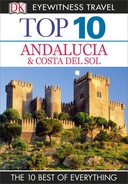Special Concerns
1. Disabled Travellers
Historically lagging behind in providing for people with mobility problems, Spain has now begun to catch up in creating more accessibility. At least at the airport you should find adequate facilities – as long as you notify your travel agent and/or airline of your needs in advance and then reconfirm a week before departure.
2. Disabled Accommodation
The older buildings, often refurbished medieval structures, are usually entirely without facilities for the disabled – there are endless stairways and levels to contend with, sometimes even within a single room. Stay in one of the newer hotel you can find, where lifts and bathrooms will probably be large enough and will all comply with EU laws for disability access. But be sure to check details before booking.
![]() Access-Able Travel Services • www.access-able.com
Access-Able Travel Services • www.access-able.com
![]() Access Travel • 01942 888844 • www.access-travel.co.uk
Access Travel • 01942 888844 • www.access-travel.co.uk
![]() Mobility International USA • Eugene, OR • 541 343 1284 • www.miusa.org
Mobility International USA • Eugene, OR • 541 343 1284 • www.miusa.org
![]() Australian National Disability Services • 02 628 33200 • www.nds.org.au
Australian National Disability Services • 02 628 33200 • www.nds.org.au
![]() Organización Nacional de Ciegos de España (ONCE) • C/Resolana 30, Seville • 954 90 16 16 • www.once.es
Organización Nacional de Ciegos de España (ONCE) • C/Resolana 30, Seville • 954 90 16 16 • www.once.es
3. Senior Citizens
The area is very senior-friendly, given the large numbers of international retirees who choose these sunny climes. Many apartment complexes are designed exclusively with seniors in mind, and hotels as well. Seniors also qualify for discounted fees to many sights, travel and even some hotels.
4. Resources for Seniors
There are several educational organizations that cater to seniors, with extensive residential cultural programmes of all types. In addition, the Junta de Andalucía has a helpline for those who can speak Spanish.
![]() Senior Helpline • 900 85 83 81
Senior Helpline • 900 85 83 81
![]() Road Scholar • www.roadscholar.org
Road Scholar • www.roadscholar.org
5. Women Travellers
Compared to Northern Europe, attitudes here towards women can be pretty macho. Still, women generally do not encounter harassment and can travel alone without a problem. Naturally, exercise normal care, especially after dark.
6. Helplines
The Junta de Andalucía runs several helplines, which are free calls from any phone, but they are Spanish-speaking only.
![]() Women • 900 20 09 99
Women • 900 20 09 99
![]() Drug addiction • 900 84 50 40
Drug addiction • 900 84 50 40
7. Student Travellers
Many students come to study in Seville, Granada and Córdoba. A valid International Student ID Card entitles you to some price reductions on entrance fees and travel. There are student information centres in major cities.
![]() Instituto Andaluz de la Juventud • C/Bilbao 8–10, Seville • 955 03 57 00
Instituto Andaluz de la Juventud • C/Bilbao 8–10, Seville • 955 03 57 00
![]() Centro Municipal de Información Juvenil • C/Veronica de la Magdalena 23, Granada • 958 53 67 24
Centro Municipal de Información Juvenil • C/Veronica de la Magdalena 23, Granada • 958 53 67 24
![]() La Casa de la Juventud • C/Campo Madre de Dios, Córdoba • 957 76 47 07
La Casa de la Juventud • C/Campo Madre de Dios, Córdoba • 957 76 47 07
8. Public Conveniences
Public toilets are scarce, but bars are everywhere and they are legally bound to let you use their facilities. Always carry tissue. An “S” on the door stands for Señoras (Ladies) and a “C” indicates Caballeros (Gents), although there are variations.
9. Gay Travellers
In more cosmopolitan areas, attitudes towards gays and lesbians are relaxed, but less so in rural areas.
![]() International Gay & Lesbian Travel Association • www.iglta.org
International Gay & Lesbian Travel Association • www.iglta.org
![]() COLEGAS • 954 50 13 77 • www.colegaweb.org
COLEGAS • 954 50 13 77 • www.colegaweb.org
10. Gay Areas
Torremolinos is gay-central for nightlife. Seville, Granada and Cádiz also have significant gay populations.
